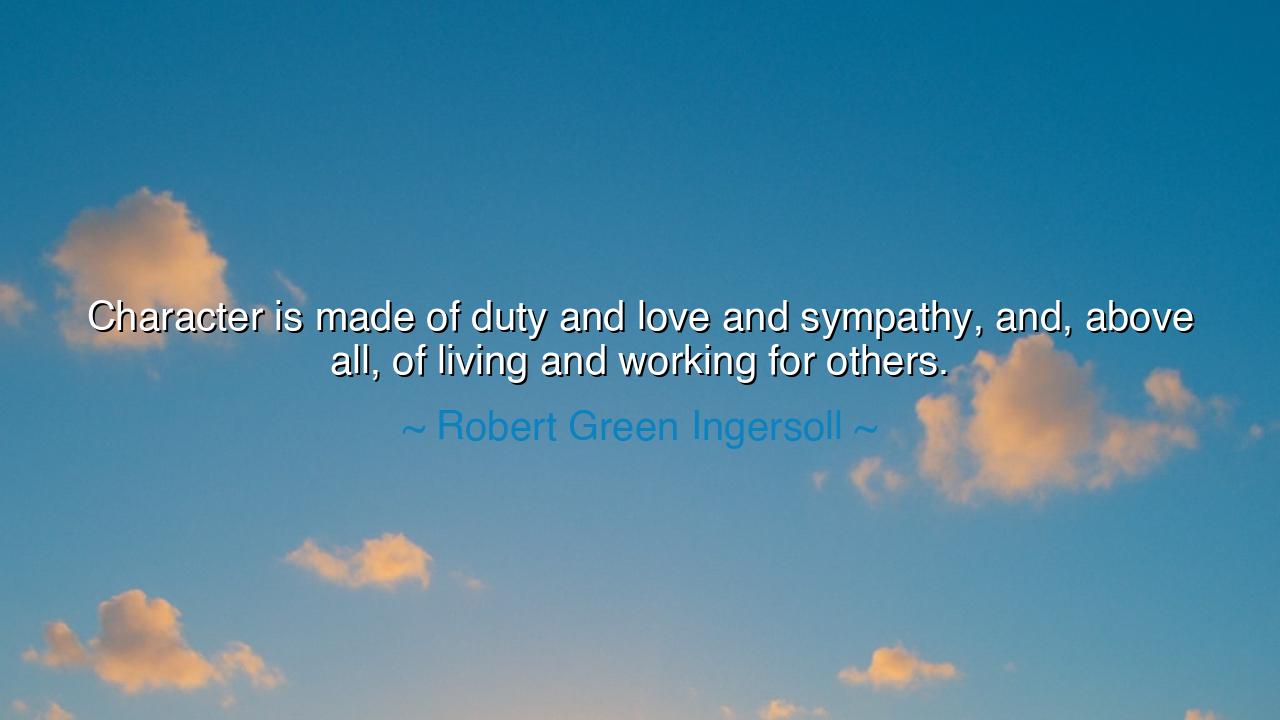
Character is made of duty and love and sympathy, and, above all
Character is made of duty and love and sympathy, and, above all, of living and working for others.






Hear, O future generations, the words of Robert Green Ingersoll, who speaks with the wisdom of the ancients: "Character is made of duty and love and sympathy, and, above all, of living and working for others." These words, simple yet profound, call us to examine the essence of true character—the very foundation upon which a noble life is built. Ingersoll reminds us that character is not born of fame, wealth, or status, but is instead forged through the quiet, selfless acts of duty, love, and sympathy, and above all, through a life devoted to others. It is not what we accumulate, but how we give, that defines us.
In the ancient world, O children, the greatest leaders and sages understood that character was the bedrock of a noble life. Consider Socrates, the great philosopher of Athens. He was not wealthy, nor was he famous in his time. Yet, his character has echoed through the centuries. Socrates’ life was marked by duty—a duty to seek wisdom and to challenge those in power for the sake of truth. He lived with a profound love for his fellow man, dedicating his life to the service of others through his teachings. And his sympathy was evident in his willingness to die for his beliefs, knowing that in doing so, he would inspire future generations to live in pursuit of truth and justice.
Hannibal Barca, the Carthaginian general, too, embodied these qualities in the most tumultuous of times. Hannibal was a man driven by duty to his people, a duty to resist the Roman empire that sought to crush his home. His love for his soldiers and his sympathy for their struggles was legendary. He marched them across mountains and deserts, enduring hardships to fight for the freedom of his people. He knew that his greatness as a leader was not in the glory of battle, but in his ability to work for the good of others—his people, his soldiers, and his homeland. In this, Hannibal’s character was formed—not by conquest alone, but by his service and dedication to others.
In more recent history, Florence Nightingale, the founder of modern nursing, exemplified this same truth. Nightingale's character was forged in the fires of selfless duty, love, and sympathy. When she saw the suffering of soldiers during the Crimean War, she did not turn away. Instead, she answered the call to serve, working tirelessly to care for the wounded, even at the risk of her own life. Her life was dedicated to others, and in doing so, she reshaped healthcare forever. Her legacy is a testament to the idea that true character is built not by personal gain but by how one lives for the benefit of others.
And so, O children, the lesson is clear: character is not something we are born with; it is something we create through our actions. Duty is the call to serve the greater good, to take responsibility for our lives and the lives of those around us. Love is the force that drives us to act with kindness, to care for others as we would care for ourselves. Sympathy is the deep understanding that allows us to see the world through the eyes of others, to share in their pain and joy, and to offer help where it is needed most. It is in living for others—in giving without expectation, in working for the common good—that true character is forged.
In your own lives, O future generations, you will be called to build your own character. You will face moments where your duty will demand great sacrifice, where your love for others will be tested, and where your sympathy will lead you to help those in need. Do not shy away from these challenges, for it is through these trials that your character will be shaped. Remember that it is not in moments of comfort or ease that we find our true worth, but in the ways we serve others, in the love we offer, and in the sympathy we extend to those who are suffering.
Let this be your guiding principle, O children: that true greatness lies not in what you accumulate, but in what you give. Build your character not on wealth or fame, but on duty, love, and sympathy. Live a life that works for others, and in doing so, you will leave behind a legacy of true greatness, one that will endure long after your time on this earth has passed. The greatness of character is found in the service of others—a life well-lived is a life of service, and it is in this service that we find the deepest meaning and fulfillment.






AAdministratorAdministrator
Welcome, honored guests. Please leave a comment, we will respond soon